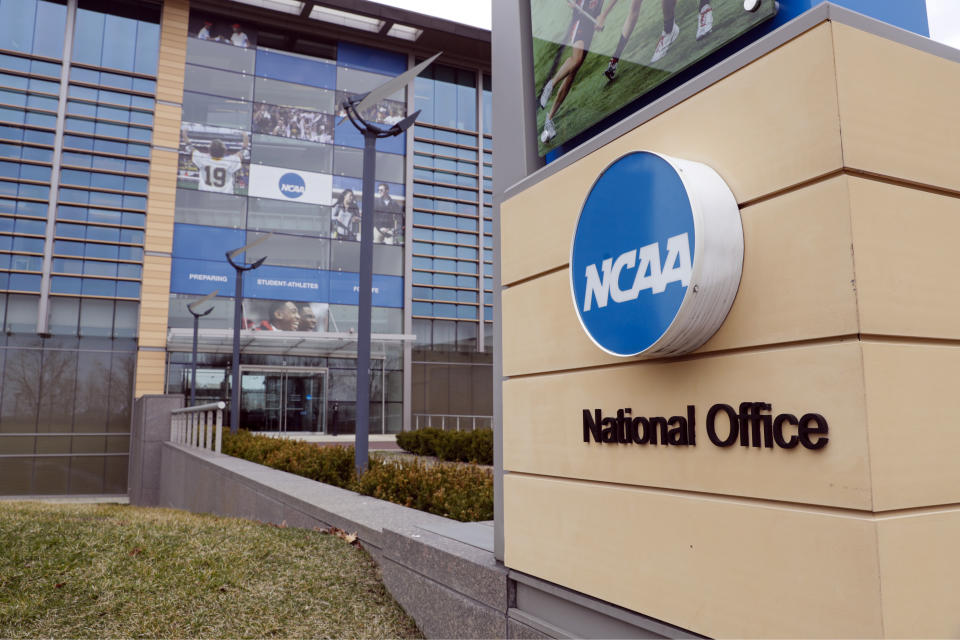NCAA expresses 'serious concerns' about holding fall seasons during COVID-19 pandemic
While the fate of fall championships will be left up to each of the NCAA’s three divisions, the NCAA’s Board of Governors announced Wednesday an array of requirements for schools and conferences if they want to play fall sports, including football, amid the coronavirus pandemic.
“The board expressed serious concerns about the continuing high levels of COVID-19 infection in many parts of the nation. The board has determined that it will only support moving forward with fall championships and other postseason play if strict conditions are applied and adhered to,” the NCAA said in a news release.
Those conditions, which span the preseason, regular season and postseason, include schools and conferences strictly following the NCAA’s return-to-sport guidelines and adhering to federal, state and local COVID-19 guidelines.
The conditions also provide protections for athletes after football players from the Pac-12 and Big Ten expressed concerns about playing in 2020 while calling out the NCAA’s “lack of leadership with respect to player safety.”
NCAA COVID-19 protections for athletes
For instance, the NCAA says it will establish a phone number and email address that allows athletes or their parents to “report alleged failures” in following COVID-19-related protocols by schools. The NCAA will then “notify school and conference administrators, who will be expected to take immediate action.”
Additionally, all athletes “must” be permitted to opt out of their seasons if they are concerned about contracting COVID-19. Schools are required to honor the athletic scholarship of any individual who chooses to opt out.
Other protections for NCAA athletes include prohibiting schools from requiring athletes to waive their legal rights regarding COVID-19 “as a condition of athletics participation” and mandating that schools cover COVID-19 related medical expenses “to prevent out-of-pocket expenses for college athletes and their families.”
“The first and most important consideration is whether sports can be conducted safely for college athletes,” said Michael V. Drake, chair of the NCAA’s board. “Each division must examine whether it has the resources available to take the required precautions given the spread of COVID-19.”
Added NCAA president Mark Emmert:
“Our decisions place emphasis where it belongs — on the health and safety of college athletes. Student-athletes should never feel pressured into playing their sport if they do not believe it is safe to do so. These policies ensure they can make thoughtful, informed decisions about playing this fall.”
The NCAA set an Aug. 14 deadline for each division to determine “eligibility accommodations” for athletes who decide not to participate this fall or for athletes whose seasons are canceled or cut short due to the pandemic.
“College athletes and their families must know what their eligibility status will be before beginning the fall season,” the NCAA said.

What will happen with NCAA fall championships?
The NCAA Board of Governors met on Tuesday and decided that each NCAA division — Division I, II and III — will make its own decision about its fall championships. Those decisions — whether or not fall sports seasons and championships will take place — must be reached by Aug. 21.
Divisions II III did not wait long to make their decisions. Both announced Wednesday that their fall sports championships have officially been canceled. D-III made the announcement first with D-II following suit a few hours later.
Division III Presidents Council cancels fall championships: https://t.co/bvpoNxsjbF pic.twitter.com/zg5XsyW7LC
— NCAA Division III (@NCAADIII) August 5, 2020
DII Presidents Council cancels fall 2020 championships: https://t.co/ANi4gC6C6b pic.twitter.com/DsUF0vrsQt
— NCAA Division II (@NCAADII) August 5, 2020
If 50 percent or more of eligible teams in a sport in a division cancel their fall seasons, the NCAA said there will be no fall championships in that sport in that particular division. And if a championship is postponed instead of outright canceled, a decision whether or not to hold the championship at a later date “will be based upon the scientific data available at that time regarding COVID-19, along with other considerations.”
This determination from the NCAA, of course, leaves open the chance for Division I competition to take place while the two lower levels do not play fall sports. And even if Division I fall championships are called off, it would not affect football at the highest level. The Football Bowl Subdivision (FBS) operates separately with its championship governed by the College Football Playoff.
The Division I decision will be left up to the Division I Council, which is scheduled to meet next week.
“We will continue to collaborate with medical experts and engage with the Football Oversight Committee, Competition Oversight Committee and national office championships staff,” said Council chair M. Grace Calhoun, the athletic director at Penn.
More from Yahoo Sports:

 Yahoo Finance
Yahoo Finance 